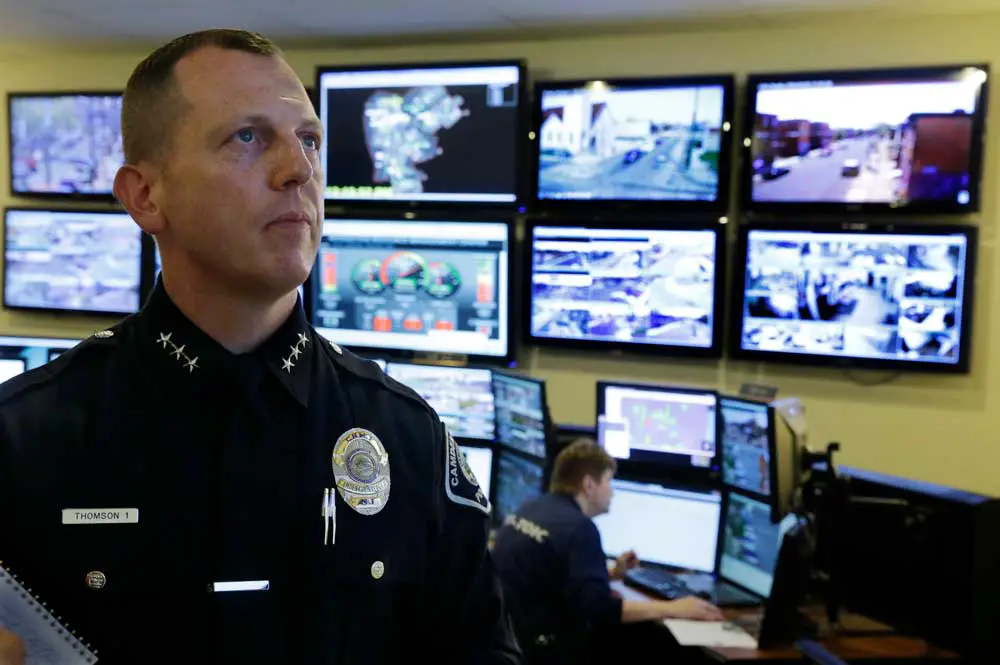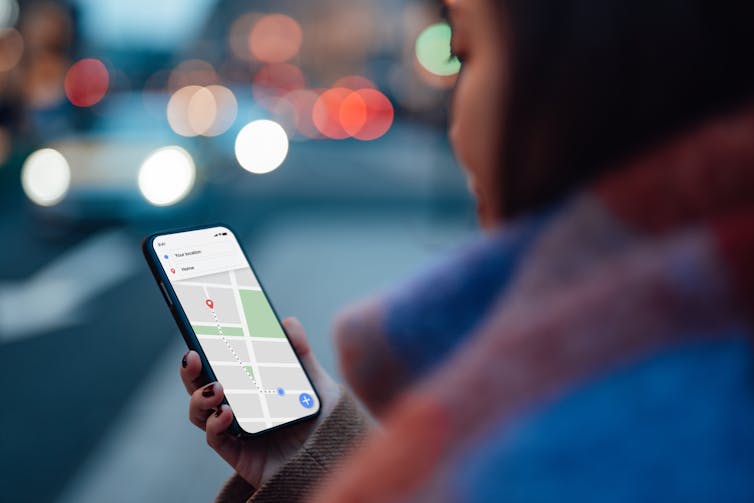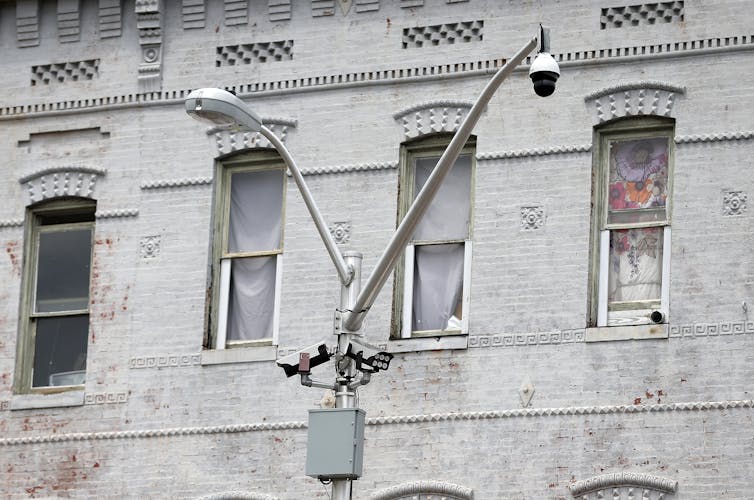
By Peter Krapp
The U.S. has the largest number of surveillance cameras per person in the world. Cameras are omnipresent on city streets and in hotels, restaurants, malls and offices. They’re also used to screen passengers for the Transportation Security Administration. And then there are smart doorbells and other home security cameras.
Most Americans are aware of video surveillance of public spaces. Likewise, most people know about online tracking – and want Congress to do something about it. But as a researcher who studies digital culture and secret communications, I believe that to understand how pervasive surveillance is, it’s important to recognize how physical and digital tracking work together.
Databases can correlate location data from smartphones, the growing number of private cameras, license plate readers on police cruisers and toll roads, and facial recognition technology, so if law enforcement wants to track where you are and where you’ve been, they can. They need a warrant to use cellphone search equipment: Connecting your device to a mobile device forensic tool lets them extract and analyze all your data if they have a warrant.
However, private data brokers also track this kind of data and help surveil citizens – without a warrant. There is a large market for personal data, compiled from information people volunteer, information people unwittingly yield – for example, via mobile apps – and information that is stolen in data breaches. Among the customers for this largely unregulated data are federal, state and local law enforcement agencies.
How you are tracked
Whether or not you pass under the gaze of a surveillance camera or license plate reader, you are tracked by your mobile phone. GPS tells weather apps or maps your location, Wi-Fi uses your location, and cell-tower triangulation tracks your phone. Bluetooth can identify and track your smartphone, and not just for COVID-19 contact tracing, Apple’s “Find My” service, or to connect headphones.
People volunteer their locations for ride-sharing or for games like Pokemon Go or Ingress, but apps can also collect and share location without your knowledge. Many late-model cars feature telematics that track locations – for example, OnStar or Bluelink. All this makes opting out impractical.

Oscar Wong/Moment via Getty Images
The same thing is true online. Most websites feature ad trackers and third-party cookies, which are stored in your browser whenever you visit a site. They identify you when you visit other sites so advertisers can follow you around. Some websites also use key logging, which monitors what you type into a page before hitting submit. Similarly, session recording monitors mouse movements, clicks, scrolling and typing, even if you don’t click “submit.”
Ad trackers know when you browsed where, which browser you used, and what your device’s internet address is. Google and Facebook are among the main beneficiaries, but there are many data brokers slicing and dicing such information by religion, ethnicity, political affiliations, social media profiles, income and medical history for profit.
Big Brother in the 21st century
People may implicitly consent to some loss of privacy in the interest of perceived or real security – for example, in stadiums, on the road and at airports, or in return for cheaper online services. But these trade-offs benefit individuals far less than the companies aggregating data. Many Americans are suspicious of government censuses, yet they willingly share their jogging routines on apps like Strava, which has revealed sensitive and secret military data.
In the post-Roe v. Wade legal environment, there are concerns not only about period tracking apps but about correlating data on physical movements with online searches and phone data. Legislation like the recent Texas Senate Bill 8 anti-abortion law invokes “private individual enforcement mechanisms,” raising questions about who gets access to tracking data.
In 2019, the Missouri Department of Health stored data about the periods of patients at the state’s lone Planned Parenthood clinic, correlated with state medical records. Communications metadata can reveal who you are in touch with, when you were where, and who else was there – whether they are in your contacts or not.
Location data from apps on hundreds of millions of phones lets the Department of Homeland Security track people. Health wearables pose similar risks, and medical experts note a lack of awareness about the security of data they collect. Note the resemblance of your Fitbit or smartwatch to ankle bracelets people wear during court-ordered monitoring.
The most pervasive user of tracking in the U.S. is Immigration and Customs Enforcement (ICE), which amassed a vast amount of information without judicial, legislative or public oversight. Georgetown University Law Center’s Center on Privacy and Technology reported on how ICE searched the driver’s license photographs of 32% of all adults in the U.S., tracked cars in cities home to 70% of adults, and updated address records for 74% of adults when those people activated new utility accounts.

AP Photo/Julio Cortez
No one is watching the watchers
Nobody expects to be invisible on streets, at borders, or in shopping centers. But who has access to all that surveillance data, and how long it is stored? There is no single U.S. privacy law at the federal level, and states cope with a regulatory patchwork; only five states – California, Colorado, Connecticut, Utah and Virginia – have privacy laws.
It is possible to limit location tracking on your phone, but not to avoid it completely. Data brokers are supposed to mask your personally identifiable data before selling it. But this “anonymization” is meaningless since individuals are easily identified by cross-referencing additional data sets. This makes it easy for bounty hunters and stalkers to abuse the system.
The biggest risk to most people arises when there is a data breach, which is happening more often – whether it is a leaky app or careless hotel chain, a DMV data sale or a compromised credit bureau, or indeed a data brokering middleman whose cloud storage is hacked.
This illicit flow of data not only puts fuzzy notions of privacy in peril, but may put your addresses and passport numbers, biometric data and social media profiles, credit card numbers and dating profiles, health and insurance information, and more on sale.
![]()
Peter Krapp is Professor of Film & Media Studies at the University of California, Irvine.





























Pat says
In Palm Coast, where exactly are the video cameras? The license plate readers, traffic cameras?
Timothy Patrick Welch says
The article includes the total surveillance by private, commercial, and government.
Some countries have more government surveillance. With most surveillance being common in the urban areas.
Laurel says
Pat:
Look to the side while entering or exiting I-95 to/from Palm Coast. Why does PC need to monitor every car entering or exiting the city? Big Brother is watching you. Today’s younger people are groomed to except this. They don’t know a life with privacy.
Jimbo99 says
Of course abuses will happen, but this surveillance video is a win for the program when they catch the shooter. And they will when they identify him. If you’re doing nothing wrong, it’s boring video that never gets reviewed. A crime and now all of a sudden there’s an eye witness in a camera that the crime itself triggers. Hey, the 2 15 year olds that were sentenced to 15 years each, the 34 yo felon too, they know who the 4th Musketeer that is still at large is. That’s not comforting to know that the 4th one is out there doing something else. Hopefully they have his DNA from the home invasion and he’s dumb enough to get caught for something else later & the DNA matches. Since the other 3 aren’t cooperating in the home invasion investigation crime.
https://www.nbcmiami.com/news/local/video-shows-man-threatening-victim-with-machete-before-shooting-him-in-oakland-park/2811722/
https://s1.fwmrm.net/m/1/382114/21/45276949/XPOB007200030H_ENT_MEZZ_HULU_5398637_578.mp4
Lamo says
Good article. Government over-reach.
Ritchie says
Google needs no legal authorisation to collect info.
I did not use Google to track or trade stocks, but it volunteers to show me where the stocks I dealt with twenty some yeas ago it is today.
Dennis C Rathsam says
George Orwell was right…..so many many years ago!!!!
Timothy Patrick Welch says
Florida Constitution Section 23,
Right of privacy.—Every natural person has the right to be let alone and free from governmental intrusion into the person’s private life except as otherwise provided herein…
While I generally think less laws are better, Florida could do more especially concerning areas like identity theft, personal data collection, and profiling. Including probable cause warrants to collect or access this data.
A Concerned Observer says
Well Timothy, let’s see how you feel when you are injured by a hit and run driver at a local intersection with a traffic camera or when the other driver is captured down the road by a license plate camera that allows the authorities to identify and apprehend the other driver. People don’t want surveillance cameras until they need them for their own benefit. As the saying goes, “There are no atheists in a foxhole.” Well, there are no camera haters among victims of crimes. The bottom line is that if you are doing nothing wrong, you have absolutely nothing to worry about from Flagler County traffic cameras. BTW, many people incorrectly believe the devices shaped like a carton of cigarettes on overhead traffic lights are surveillance cameras, they are not. They are for traffic light control. In addition, if you walk up to my front door in the middle of the night, you will be recorded.
Laurel says
Concerned: You need to read 1984 by George Orwell. Big Brother used the same argument as you.
Potato Head says
Now lets talk predictive analytics and the possibility of using all this data and tech for the purpose of psychological warfare on selected citizens. I am currently a registered democrat whose information and address is public record no thanks to our public records laws. I was an ACLU member, a Union Steward, Southern Poverty Law Center member, Electronic Frontier Foundation member and an outspoken thorn in the side of the FAA that has documented and reported multiple low flying and noise related issues from local flight school operations. Basically, I’ve always believed in a better place for all of us, our environment and our liberties. Unfortunately, I feel it has come at a cost and due to my current and past associations (that I’m proud of) I’ve found myself and my family a target for some who appear to possess far right ideologies. As I understand it, through various publicly available articles, militias and other nefarious groups communicate tactically in groups using encryption. I’ve witnessed Three Percenters follow me on the roadway, into stores, park right up next to me in parking lots and harass me at my workplace using tactics that are unique in way that do not fall under the legal definition of harassment. Based on their behaviors I feel these people most likely have some type military training or background in psyops and logistics. Imagine someone or a group of individuals frequenting your workplace and asking the same random question over and over with a smirk. Then continuously returning over the course of months, even years asking the same question with the same ol’ smirks as if trying to provoke a negative reaction. Yes, that’s right, the same group of individuals entering separately and engaging in the same behaviors repeatedly. When they would leave, usually their logos and ideologies would be plastered all over their vehicles including Trump decals, 1776, second amendment, blue lines, etc. Most notably though… Three Percent logos. For the purpose of length, time and anonymity I won’t get into much other details but I will say that I found it very peculiar that as all this tech was rolling out over the past several years and the placement of LPR’s and cameras at intersections began to occur, the accuracy and frequency of these “non incidents” would begin to happen and in different forms. Somehow they new my schedule, arrival time at work and when I left.
Even more bizarre, recently I had a discussion in my vehicle when I mentioned “coincidentally” the same make and model vehicle as mine would appear at a majority of intersections I passed though on a regular basis. When I began to notice this occurrence, I didn’t have the most popular vehicle model on the road and it was rare that I would even pass a vehicle of the same model on the highway. On most days about a hundred random vehicles would pass before witnessing one that was same make as mine. Though recently my vehicle model has gained in popularity, the rarity of passing one remains similar today on the highway and on most roads. That is why I found it a bit strange that suddenly the same model vehicle was showing up at intersections I would repeatedly drive through on a daily basis. Since I previously had this discussion out loud (mobile phone powered on and in close proximity) and most major intersections in the area now have cameras and LPR’s, the sightings have increased at these same intersections I frequently pass through. Not only that, now they are appearing when I am exiting or entering frequented exits on the interstate. Rarely does this occur before or after these exits or intersections but it’s now happening at these exact points of location almost every time. Before anyone writes this off as having some sort of mental illness associated with “learned associations,” (for all you psychologists out there) I can prove you wrong. When I power my phone off and ride a bike to an intersection I frequently pas through, there will be a “normal” flow of different make and model vehicles. It takes a while before I witness one similar to mine. In other words, it seems mathematically improbable for this phenomena to exist at the frequency that it does without something very coordinated and well organized behind it. With the use of todays available data, license plate readers, ring cameras and other location information it is very possible that a well funded group using predictive analytics could be engaged in a psychological operation of this scope. Who has access to all that location data along with the capabilities of using predictive analytics with the above mentioned technology? Law Enforcement, DHS, ICE, possibly military and the list goes on. It is also no secret that militias and hate groups have had success penetrating and recruiting some in law enforcement and active or retired military. I suggest our elected officials and law makers face the reality of what can happen when all this tech and data gets into the wrong hands. Actual real crimes can be solved using the same methods law enforcement has throughout history. Using today’s surveillance technology on the overall population is un-American and the risks of having that kind of Genie out of the box is far too tempting for some to use for nefarious purposes. Put the Genie back in the box.
We see you says
Somebody is PARONIOD …… Dude, you need to CHILL, nobody is after you. Sounds like you have a guilty conscience .
Potato Head says
“We see you,” I hope you’re not a detective or aspiring to be one. You’d be doing the public a great disservice.
James says
The first paragraph of your comment sounds plausible, I too think Florida privacy laws are too lax… it is indeed far too easy for someone to become a victim of discrimination here. And in our current partisan political environment, particularly based on political affiliation… it’s far too easy for someone to check a persons political party from online voting records.
But your second paragraph does not.
To what end would this individual or group of individuals be working toward by showing up at an intersection in a car of the same make/model as yours, over and over? Also, are you assuming here that this group is sharing one car, just like your car, with a change of driver?… Or do you feel this is a group, each member of which has a car just like yours?
Either way, what you’re implying/describing doesn’t seem plausible (too me anyway). Did you perhaps consider trading in your car for a new one?… Or in your case even better, some old, obscure model?… Just a suggestion. :-)
Roger says
If your ever think about “Going down the Rabbit Hole”, first thing you do is drive over a TALL bridge over an inlet and throw your cell phone away. Next, ditch you car or truck in a State Forest and set it on fire ( remove tags first ). Then bury the tags in another city that you pass thru. Have another means of transportation already bought with cash and registered to a fictious name. In 3 days, dump that vehicle and take a motorcycle or bicycle to a bus station. You should already have grown a beard, cut your hair, bought glasses, change your style of clothes. Pretend your OLD if your young. Pretend your YOUNG if your old. Learn Spanish and speak it everywhere you go. ENJOY YOUR NEW PRIVACY AND FREEDOM
Peggy says
Roger, the perfect answer. thanx. the terrorists become terrified. what a concept!
Ben says
Peggy, Can you elaborate on what you mean by “terrorists?” Are there any that you suspect in the area? If so, in your definition how would you describe one?